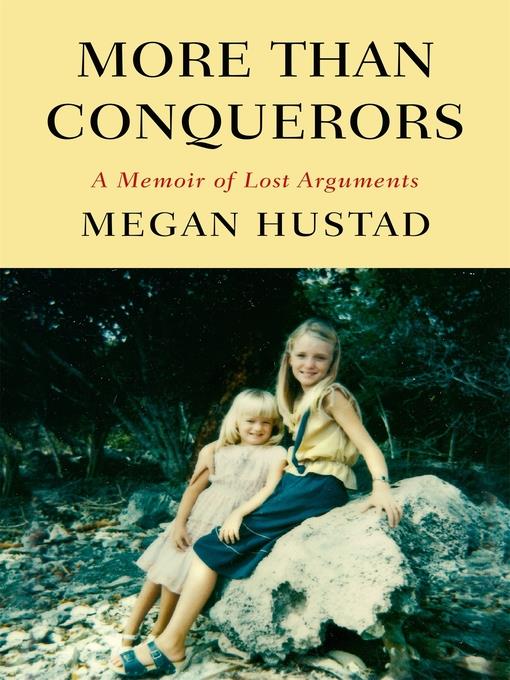
More Than Conquerors
A Memoir of Lost Arguments
کتاب های مرتبط
- اطلاعات
- نقد و بررسی
- دیدگاه کاربران
نقد و بررسی

December 23, 2013
The daughter of Christian evangelical missionaries, Hustad (How to be Useful) offers an earnest, at times brain-rattling and murky, overall very human attempt to reconcile the ideals of her parents with the clash of the secular world. In 1978, the Minnesota-based family, consisting of her father, Stan, a teacher, her mother, Karen, a secretary, Hustad, then three, and her older sister, Amy, embarked on several years of mission work: first to Bonaire, in the Netherlands Antilles, where the parents worked at the evangelical Trans World Radio. The family had to rely on donations by the home congregation, indeed they were a "charity case," as Hustad and Amy recognized only much later, yet rich in faith and a willingness to fit in, such as learning Dutch in the Catholic school the girls attended. Relocated with her family to Bussum, Holland, in 1983, then back to Minnesota four years later, Hustad was considered by her contemporaries as a kind of exotic, clueless about cultural cues such as music and dress as she was beginning to doubt her own faith in God. Full-throttle secularization accompanied her move to New York City and work in publishing. Yet she remained forgiving toward her family's unconventional trajectory, as amply demonstrated in this groping, endearing attempt at "fumbling way back toward hopes we called God."

December 1, 2013
A daughter of evangelical missionaries reflects on the complexities of faith. Hustad (How to be Useful: A Beginner's Guide to Not Hating Work, 2008) was born in Minneapolis, where her family had relatives and roots. But her parents felt a religious calling, and soon, young Megan and her sister, Amy, were transported to the Caribbean island of Bonaire, where her father took a post with Trans World Radio, broadcasting God's word over shortwave. Bonaire, flat and salt-rich, "offered excellent conductivity for radio signals," heard as far north as Canada and south to the Amazon. After a few years on the buggy, soggy island, the family returned to Minnesota, awaiting a new assignment: this time, to Holland. When Megan protested that she didn't want to live in a foreign country, her mother replied, "That's too bad....Because you live in one now." Alienated from 1980s American culture, Hustad's parents felt out of place in Holland, as well, where the supervisor of TWR was intent on making Christian views relevant in "the marketplace of ideas." Maybe phone-in programs would help; maybe market research: "[B]ad programming," he insisted, "placed a strain upon the sovereignty of God." When her father's conflict with the supervisor proved unresolvable, the family was offered another post in Sri Lanka. Instead, they returned to Minnesota. Amy, 18, had long before rejected her family's life of near poverty and cultural isolation. Megan, 12, still went weekly to the church youth group "because I was not prepared not to. I was initially expected to be better at God but everyone quickly realized that I was not." Escaping to New York City as soon as she could, Megan met people "who associated religious belief with rank stupidity" and even pathology, leading her to reconsider her own complicated connections to faith. Some tediously detailed sections and an impressionistic structure weaken the overall impact of Hustad's memoir.
COPYRIGHT(2013) Kirkus Reviews, ALL RIGHTS RESERVED.

February 1, 2014
Christianity has saturated every corner of Megan Hustad's life. From her missionary childhood abroad to her life as an adult in New York dodging questions about her religious past, Hustad explores the legacy of her family's particular brand of faith in this thoughtful, subtly shaded memoir. Drawing on documents and discussions, she takes a kaleidoscopic view of her family's life as missionaries, which took them from Minnesota to a small island off Venezuela, then to Holland and back. Hustad challenges the easy dismissal of evangelicals as Neanderthals, providing a well-rounded look at the complex messages that informed her family's work. At the same time, she spotlights the limitations this religiously focused life imposed on her family, exploring their conflicts, their uneasy compromises, and the roots of their lingering resentment toward one another. Her recollections, interspersed with short vignettes, derive much of their power from Hustad's unerring ability to pinpoint emotion clearly and concisely. The result is a critique that is not ham-fistedly critical but refreshingly open to different interpretations of what it means to live with faith.(Reprinted with permission of Booklist, copyright 2014, American Library Association.)

























دیدگاه کاربران